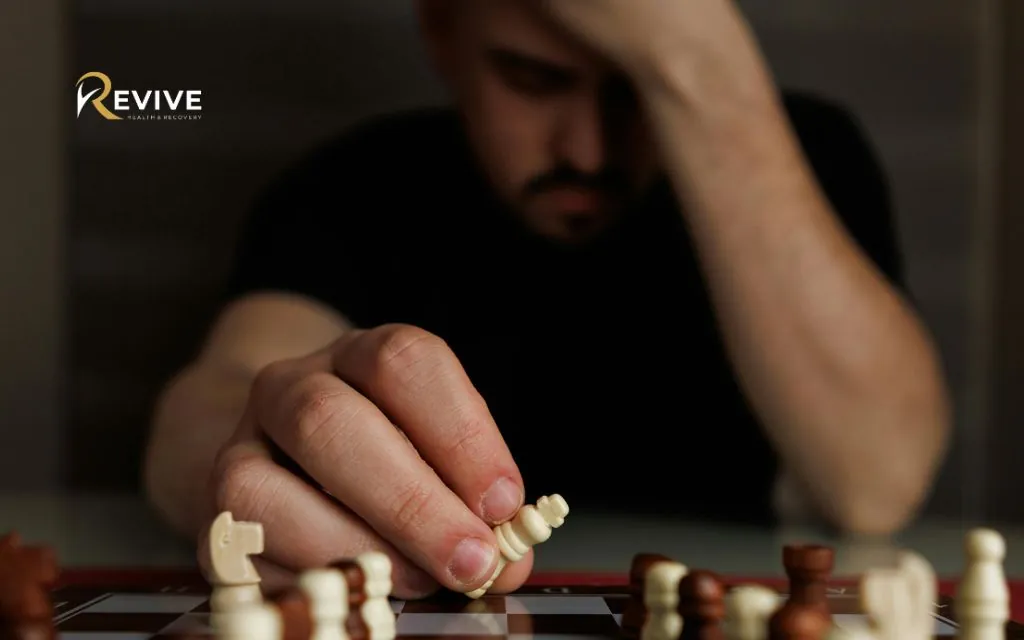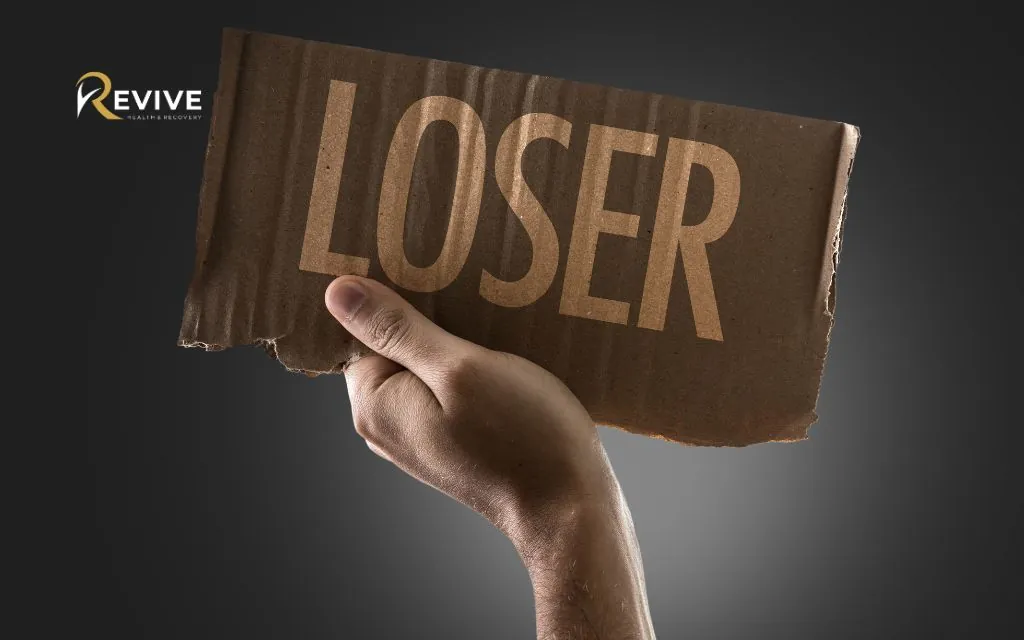Feeling like a “loser” is more common than you might think. You’re not alone in experiencing these overwhelming emotions. This persistent sense of inadequacy, failure, and self-criticism often signals deeper psychological processes at work. Depression and cognitive distortions can trap us in cycles of negative self-perception.
As mental health professionals, we understand that these feelings aren’t character flaws or permanent states. They’re symptoms that can be addressed through evidence-based treatments like Cognitive Behavioral Therapy (CBT), developed by renowned psychiatrist Aaron Beck. Whether you’re in Denver, Colorado Springs, or anywhere across Colorado, understanding the science behind these feelings is the first step toward healing and reclaiming your self-worth.
The psychology behind “loser” feelings
Cognitive distortions and negative self-talk
Aaron Beck identified a cognitive triad that explains ‘why do i feel like such a loser’ feeling. This triad involves negative thoughts about yourself, the world around you, and your future. These distorted thinking patterns create a filter that makes you interpret neutral or positive events as proof of your inadequacy.
Common cognitive distortions include all-or-nothing thinking, where you see yourself as either a complete success or total failure. Personalization makes you blame yourself for events beyond your control. Mental filtering causes you to focus only on negative aspects while ignoring positive ones. The inner critic voice develops from early experiences and continues to reinforce these patterns.
Beck’s observations in the 1960s revolutionized how we understand depression. He noticed that patients had automatic negative thoughts that seemed to appear without conscious effort. These thoughts weren’t based on reality but on distorted perceptions that had become habitual.

Depression’s role in self-perception
Depression alters brain chemistry and thought patterns in measurable ways. When you have ‘why do i feel like such a loser’ feeling, your brain’s prefrontal cortex shows changes that affect decision-making and self-evaluation. Neurotransmitters like serotonin and dopamine play crucial roles in how you perceive your worth and capabilities.
Research shows that people experiencing depression have increased activity in brain regions associated with self-criticism and rumination. This neurological change makes negative self-referent thinking more automatic and persistent. The Beck Depression Inventory, one of the most widely used assessment tools, specifically measures these patterns of negative self-evaluation.
Your brain essentially gets stuck in patterns that reinforce feelings of worthlessness. Understanding this helps explain why positive thinking alone rarely works. The neural pathways need therapeutic intervention to create lasting change.
Scientific signs you’re experiencing more than just “bad days”
Clinical depression symptoms
Persistent feelings of worthlessness represent one of the core symptoms of major depressive disorder. These feelings ‘why do i feel like such a loser’ go beyond normal disappointment or temporary setbacks. Clinical depression involves diminished interest in activities you once enjoyed, significant changes in appetite and sleep patterns, and decreased energy levels that interfere with daily functioning.
Difficulty concentrating and making decisions becomes pronounced. You might find yourself unable to focus on work, school, or personal responsibilities. These cognitive symptoms often accompany the emotional ones, creating a cycle where poor performance reinforces negative self-perception.
The Beck Depression Inventory assesses these symptoms systematically. It measures not just mood but also cognitive patterns that contribute to feeling like a failure. This scientific approach helps distinguish between situational sadness and clinical depression requiring professional treatment.
Low self-esteem red flags
Constant self-criticism goes beyond healthy self-reflection. When you automatically assume the worst about your abilities or worth, you’re experiencing cognitive distortions that fuel loser mentality. Comparison to others becomes compulsive, and you consistently find yourself lacking.
Fear of failure prevents you from trying new things or taking appropriate risks. This avoidance behavior creates a self-fulfilling prophecy where lack of experience confirms feelings of inadequacy. People-pleasing behaviors and difficulty setting boundaries often stem from deep beliefs about your worth being dependent on others’ approval.
Perfectionism serves as a mask for feelings of inadequacy. You set unrealistic standards because anything less feels like proof that you’re a loser. This creates an impossible situation where success never feels genuine or lasting.
The connection between “feeling like a loser” and depression
How depression feeds negative self-perception
Depression creates neurological changes in the prefrontal cortex that affect self-evaluation. These changes make negative thoughts more automatic and positive thoughts harder to access. The brain essentially develops a bias toward information that confirms your worst fears about yourself.
Rumination becomes a dominant pattern. You repeatedly think about ‘why do i feel like such a loser’, analyzing past failures and predicting future ones. This mental activity strengthens neural pathways associated with negative self-perception while weakening ones associated with balanced thinking.
The Beck Institute’s research shows that people with depression have specific patterns of information processing. They notice criticism more readily than praise, remember failures more vividly than successes, and interpret ambiguous situations negatively. These aren’t character flaws but symptoms of a treatable condition.
Breaking the cycle through understanding automatic thoughts
Automatic thoughts appear without conscious effort and feel completely true in the moment. Learning to identify these thoughts as mental events rather than facts represents the first step in cognitive behavioral therapy. Beck discovered that these thoughts follow predictable patterns that can be recognized and challenged.
The difference between situational disappointment and persistent self-criticism lies in frequency, intensity, and duration. Normal disappointment responds to changed circumstances or the passage of time. Depression-related self-criticism persists regardless of external changes and colors every aspect of your experience.
Cognitive distortions become self-fulfilling prophecies when they influence behavior. If you believe you’re a loser, you might avoid opportunities that could prove otherwise. This avoidance confirms the original belief, creating a cycle that maintains depression symptoms.

Evidence-based treatment options
Cognitive behavioral therapy (CBT)
Aaron Beck’s revolutionary approach to depression treatment focuses on identifying and changing negative thought patterns. CBT has over 2,000 clinical studies proving its effectiveness across multiple psychiatric disorders. This makes it the gold standard for treating depression-related feelings of worthlessness.
CBT addresses the root of “loser” feelings of ‘why do i feel like such a loser’ by teaching you to examine evidence for and against negative thoughts. You learn to identify cognitive distortions and develop more balanced thinking patterns. The therapy provides practical tools for managing automatic thoughts and changing behaviors that reinforce negative self-perception.
Success rates for CBT in treating depression range from 60-80% in clinical studies. Most people begin noticing improvements within the first few sessions, with significant changes typically occurring within 12-16 weeks. The skills learned in CBT provide long-term protection against future episodes.
Additional therapeutic approaches
- Interpersonal Therapy (IPT) addresses relationship-based self-worth issues that contribute to feeling like a loser. This approach recognizes that depression often involves difficulties in personal relationships that both contribute to and result from negative self-perception.
- Mindfulness-Based Cognitive Therapy (MBCT) combines CBT techniques with mindfulness practices. This approach helps you observe thoughts without being overwhelmed by them. MBCT is particularly effective for preventing relapse in people with recurrent depression.
- Dialectical Behavior Therapy (DBT) provides skills for emotional regulation that complement CBT techniques. DBT teaches distress tolerance and interpersonal effectiveness skills that help manage intense feelings of worthlessness and inadequacy.
Practical steps to overcome these feelings
Immediate coping strategies
Thought challenging techniques provide immediate relief from automatic negative thoughts. When you notice yourself thinking “I’m such a loser,” examine the evidence supporting and contradicting this thought. Ask yourself what you would tell a friend experiencing the same situation.
Self-compassion exercises help counteract the inner critic voice. Treat yourself with the same kindness you would show someone you care about. Research shows that self-compassion is more effective than self-esteem for maintaining mental health.
Mindfulness practices for present-moment awareness interrupt rumination cycles. When you feel like a loser, ground yourself in current sensory experiences rather than getting lost in negative thoughts about past or future.
Long-term recovery strategies
Building a support network provides external reality checks for distorted thinking. Trusted friends and family members can offer perspectives that counter negative self-evaluation. Professional support through therapy accelerates this process.
Developing healthy boundaries protects your mental health from external stressors that trigger loser feelings. Learning to say no to unrealistic demands and yes to activities that support your wellbeing creates space for healing.
Creating achievable goals and celebrating small wins builds evidence against the belief that you’re a failure. Start with manageable objectives that allow for success experiences. Each accomplishment provides data that contradicts negative self-perception.

When to seek professional help
Warning signs requiring immediate attention
Suicidal thoughts or self-harm behaviors require immediate professional intervention. If you’re considering hurting yourself or ending your life, contact emergency services or call 988 for the Suicide & Crisis Lifeline. These thoughts indicate severe depression that needs professional treatment.
Substance abuse as a coping mechanism often develops when people try to numb feelings of worthlessness. Using alcohol or drugs to manage depression symptoms typically worsens the underlying condition and creates additional problems.
Complete withdrawal from social activities and responsibilities signals significant depression that won’t improve without professional help. When feeling like a loser prevents you from maintaining basic functioning, therapy becomes essential.
Finding the right mental health professional
Look for therapists with specific training in CBT and depression treatment for ‘why do i feel like such a loser’ feeling? Licensed clinical social workers, psychologists, and psychiatrists all provide effective treatment, but ensure they have experience with cognitive-behavioral approaches.
Ask potential providers about their experience treating depression and their approach to therapy. Inquire about treatment timelines and what to expect during the process. A good therapist will explain their methods and help you understand how therapy addresses your specific concerns.
Your first session typically involves assessment and goal setting. The therapist will ask about your symptoms, history, and what you hope to achieve through treatment. This collaborative approach ensures that therapy addresses your specific needs and concerns.
FAQs about question ‘why do i feel like such a loser?’
Is feeling like a loser a sign of depression?
Yes, persistent feelings of worthlessness are a core symptom of depression and often indicate underlying cognitive distortions that benefit from professional treatment. At Revive Health Recovery, we frequently see clients whose “loser” feelings resolve through evidence-based therapy approaches.
How long does it take to stop feeling like a loser with therapy?
CBT typically shows improvement within 12-16 sessions, though timeline varies by individual. Many people notice shifts in thinking patterns within the first month of consistent therapy. Revive Health Recovery provides personalized treatment plans that adapt to your specific needs and progress.
Can I overcome these feelings without medication?
Many people successfully address these feelings through therapy alone. However, for moderate to severe depression, combination treatment may be most effective. Our Denver-based team can help evaluate whether medication might benefit your specific situation.
Why do I feel like a loser even when I’m successful?
This often indicates imposter syndrome or perfectionism rooted in deeper self-worth issues. Success doesn’t automatically change ingrained thought patterns without therapeutic intervention. Revive Health Recovery specializes in addressing these complex patterns of thinking.
Is it normal to feel like this in your 20s, 30s, or 40s?
While common during life transitions, persistent “loser” feelings at any age warrant attention. These feelings often stem from unaddressed depression or anxiety rather than normal life stage challenges. Professional support can help distinguish between temporary adjustment issues and clinical concerns.
Why choose Revive Health Recovery for your healing journey
- Specialized depression treatment expertise: Our licensed therapists have extensive training in evidence-based treatments specifically for depression and low self-esteem, including CBT techniques developed by Aaron Beck. We understand the connection between feeling like a loser and underlying depression symptoms, providing targeted interventions that address root causes.
- Personalized, supportive environment: Unlike hospital settings, we provide healing in a comfortable, therapeutic environment that reduces stigma while offering intensive support for your recovery journey. Our approach recognizes that each person’s experience with depression and self-worth issues is unique, requiring individualized treatment plans.
- Colorado-focused, community-connected care: Located in Denver’s heart, we understand the unique stressors of Colorado living and maintain strong connections with local mental health resources and support networks. Our team provides culturally responsive care that considers the specific challenges facing our community.
- Holistic approach to mental wellness: We address not just symptoms but root causes, integrating therapy with lifestyle counseling, mindfulness practices, and family support systems for comprehensive healing. This approach ensures that improvements in how you feel about yourself are sustainable and long-lasting.
- Flexible treatment options with comprehensive support: Our programs adapt to your schedule and needs, with multiple therapy modalities to ensure you receive the most effective treatment. We provide the intensive support necessary to overcome persistent feelings of inadequacy and worthlessness.
Take the first step toward healing
Remember, when asking your self ‘why do I feel like such a loser’ or feeling like a “loser” is not a permanent identity. It’s a treatable symptom of depression and cognitive distortions that millions of people successfully overcome every year. The scientific research is clear: with proper treatment, these overwhelming feelings of inadequacy can be transformed into self-compassion, confidence, and genuine self-worth.
At Revive Health Recovery, we’ve helped hundreds of individuals in the Denver area break free from these destructive thought patterns and reclaim their lives. Our Denver evidence-based approach, combined with compassionate care in a healing-focused environment, provides the support you need to move from feeling like a “loser” to recognizing your inherent worth and potential.
These feelings rarely resolve without professional support. Take action today to begin your journey toward healing.
Contact Revive Health Recovery:
- Address: 1427 S Federal Blvd, Denver, CO 80219 24/7
- Support Line: (303) 268-4655 Email: contact@revivehealthrecovery.com
Your future self, confident and free from these painful thoughts, is waiting for you to begin this journey. Call today to schedule your first appointment and start building the life you deserve.



